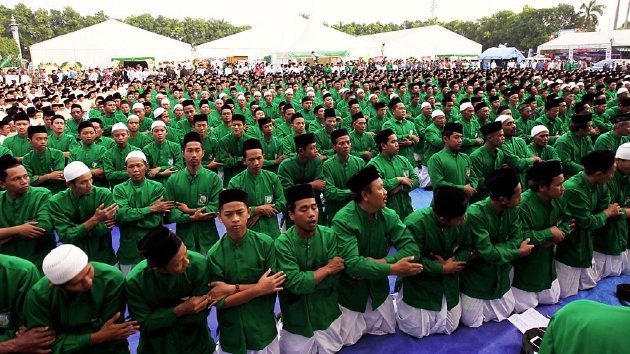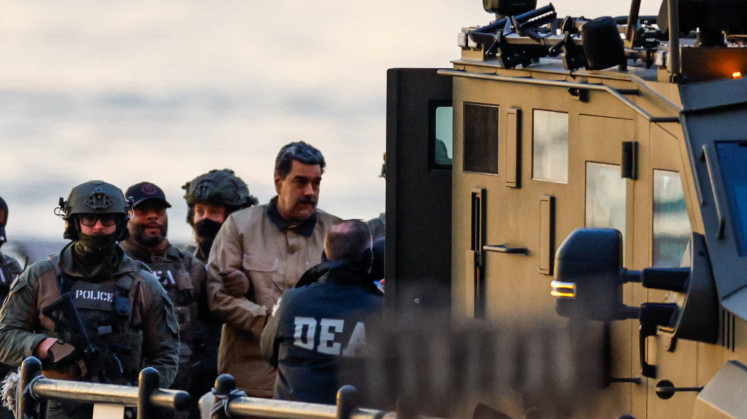Popular Reads
Top Results
Can't find what you're looking for?
View all search resultsPopular Reads
Top Results
Can't find what you're looking for?
View all search resultsJokowi, allies call for national unity amid pressure
Change text size
Gift Premium Articles
to Anyone
I
n another move to balance out his firm stance against Muslim radicals participating in sectarian rallies, President Joko “Jokowi” Widodo has toned down earlier statements about the separation of religion and politics.
Jokowi, ahead of a recent sectarian rally by conservative Muslim groups against Jakarta Governor Basuki “Ahok” Tjahaja Purnama, had warned the groups not to mix religion with politics.
While reaping criticism from Islamist political parties, his statements did not stop the rally on March 31, in which police detained five protesters, including Muslim People’s Forum (FUI) leader Muhammad Al-Khaththath.
The President later met Muslim clerics from across the nation and thanked them for maintaining religious harmony and asked them to preserve it.
“I issued a warning a few weeks ago that we should not mix politics and religion. What I meant was that the context of the warning concerns the unity of our country,” Jokowi said on Saturday during his visit to the Kholifatulloh Singo Ludiro Islamic boarding school in Sukoharjo, Central Java, where he inaugurated a new school building and mosque.
Jokowi said religion and politics should be put together in a proper context, such as in policymaking.
“In order to maintain our country’s unity, we should not let religion be politicized to become a commodity,” Jokowi went on.
In recent months, Jakarta has witnessed numerous antiAhok rallies that have also become a cause célèbre for opposing Jokowi, whose party, the Indonesian Democratic Party of Struggle (PDI-P), supports the Christian governor of Chinese descent in the Jakarta election.
On Sunday, thousands of members of the Nahdlatul Ulama, the country’s largest Muslim organization, which is affiliated with a party allied with Jokowi, the National Awakening Party (PKB), gathered in Sidoarjo, East Java, to call for national unity.
Social Affairs Minister Khofifah Indar Parawansa, who is also an NU member, attended the event, along with PKB chairman Muhaimin Iskandar and Setya Novanto, the chairman of the Golkar Party, another government ally.
“This event is expected to secure religious harmony amid current issues faced by the country,” said M. Hasan Mutawakkil Alallah, the chairman of NU’s East Java chapter, as quoted by news agency Antara.
Syafii Maarif, the former chairman of Indonesia’s second-largest Muslim organization, Muhammadiyah, also expressed concern over the use of religion as a political tool that gave rise to identity politics and social division.
“The majority of people in this country is Muslim; however, I am worried that [the majority] itself is divided and [its members] end up insulting one another,” Syafii said in Jakarta on Saturday at a discussion titled “Indonesia at a Crossroads: Pancasila Country vs Religious Country.”
The number people misusing and monopolizing the truth in the name of a certain religion might be small, but they seemed to be gaining ground, because they spoke too loudly, Syafii said. Meanwhile, the majority supporting the country’s ideology of Pancasila was mostly silent.
“Our country must not be weak in light of this threat. Authorities should be more watchful and vigilant. Don’t let vigilante groups take action,” Syafii added.
National Police chief Gen. Tito Karnavian, who was also present at the discussion, said he noticed that identity politics in the nation was getting stronger, while on the other hand Pancasila principles were fading away in society.
While noting that such identity politics was the consequence of a democratic country where unequal wealth distribution was still the underlying cause of conflict, Tito said what Indonesia needed now was to strengthen conflict prevention mechanisms.
“I think instruments like the Inter-Religious Harmony Forum (FKUB) should be further empowered to bridge communication between religious groups. If we look closely, the problem is often miscommunication,” Tito said.










